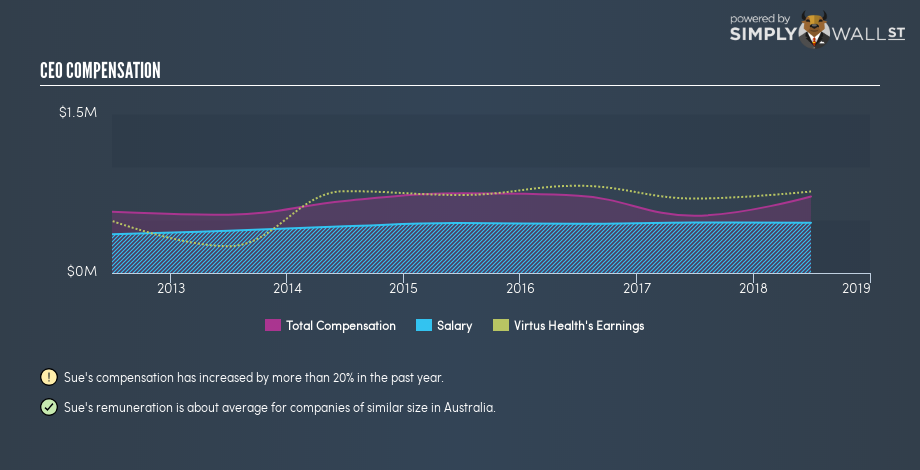Is Virtus Health Limited’s (ASX:VRT) CEO Salary Justified?

Sue Channon has been the CEO of Virtus Health Limited (ASX:VRT) since 2010. This report will, first, examine the CEO compensation levels in comparison to CEO compensation at companies of similar size. Next, we’ll consider growth that the business demonstrates. Third, we’ll reflect on the total return to shareholders over three years, as a second measure of business performance. This process should give us an idea about how appropriately the CEO is paid.
See our latest analysis for Virtus Health
How Does Sue Channon’s Compensation Compare With Similar Sized Companies?
At the time of writing our data says that Virtus Health Limited has a market cap of AU$346m, and is paying total annual CEO compensation of AU$722k. (This number is for the twelve months until 2018). While we always look at total compensation first, we note that the salary component is less, at AU$475k. As part of our analysis we looked at companies in the same jurisdiction, with market capitalizations of AU$141m to AU$564m. The median total CEO compensation was AU$779k.
So Sue Channon receives a similar amount to the median CEO pay, amongst the companies we looked at. Although this fact alone doesn’t tell us a great deal, it becomes more relevant when considered against the business performance.
You can see, below, how CEO compensation at Virtus Health has changed over time.
Is Virtus Health Limited Growing?
Virtus Health Limited has reduced its earnings per share by an average of 1.2% a year, over the last three years. Its revenue is up 2.2% over last year.
The lack of earnings per share growth in the last three years is unimpressive. The fairly low revenue growth fails to impress given that the earnings per share is down. These factors suggest that the business performance wouldn’t really justify a high pay packet for the CEO.
Shareholders might be interested in this free visualization of analyst forecasts. .
Has Virtus Health Limited Been A Good Investment?
Since shareholders would have lost about 15% over three years, some Virtus Health Limited shareholders would surely be feeling negative emotions. This suggests it would be unwise for the company to pay the CEO too generously.
In Summary…
Sue Channon is paid around what is normal the leaders of comparable size companies.
Returns have been disappointing and the company is not growing its earnings per share. Few would argue that it’s wise for the company to pay any more, before returns improve. So you may want to check if insiders are buying Virtus Health shares with their own money (free access).
Or you might rather take a peek at this analytical visualization of historic cash flow, earnings and revenue.
To help readers see past the short term volatility of the financial market, we aim to bring you a long-term focused research analysis purely driven by fundamental data. Note that our analysis does not factor in the latest price-sensitive company announcements.
The author is an independent contributor and at the time of publication had no position in the stocks mentioned. For errors that warrant correction please contact the editor at editorial-team@simplywallst.com.

